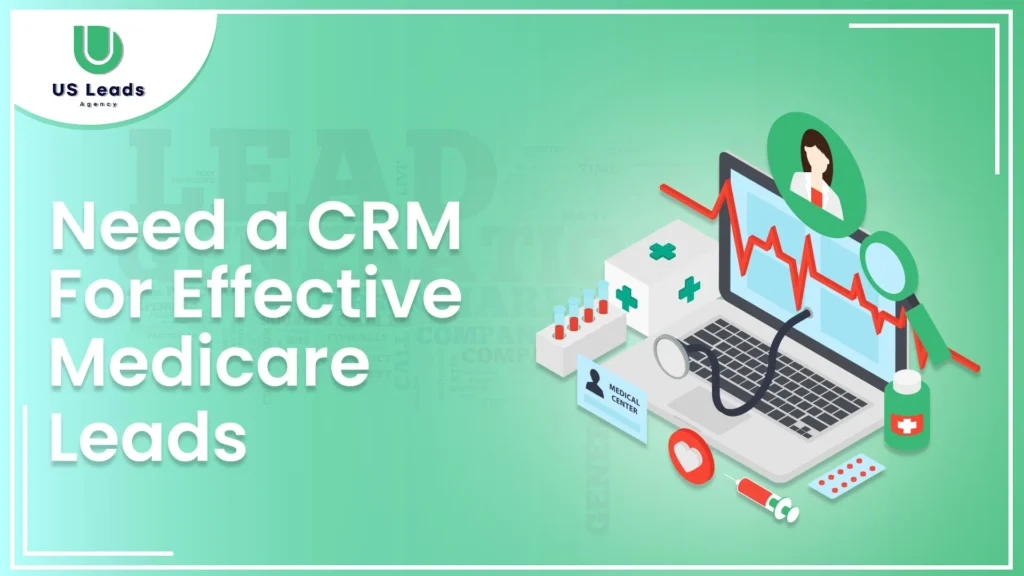
Want to know CRM for Medicare Lead Management?
The Medicare market continues to expand rapidly, especially with the aging U.S. population. According to the U.S. Census Bureau, the number of Medicare beneficiaries is projected to exceed 80 million by 2030. As more people become eligible for Medicare, competition among insurance agents and businesses intensifies.
With the rise of digital tools, including CRM systems, businesses can streamline their lead management process, improve conversion rates, and ensure compliance with industry regulations. In 2024, the Medicare market is experiencing continued growth, with the number of beneficiaries set to surpass 80 million by 2030. As competition heats up, CRM systems for Medicare lead management have become essential for businesses to efficiently track leads, personalize communication, and maximize conversions.
In this article, you will learn how a CRM can transform your Medicare lead management strategy.
Read More: Seasonal Trends In Medicare Lead Demand: Insights For 2025
Key Takeaways:
- Centralized lead management ensures that all Medicare leads are tracked and never overlooked.
- CRM automation nurtures leads and sends timely follow-ups to boost engagement.
- Personalized communication through CRM systems improves customer satisfaction and conversion rates.
- Analytics & reporting provide insights into lead performance, helping to refine marketing strategies.
- CRM systems help ensure compliance with regulations like HIPAA and safeguard customer data.
Table of Contents
The Role Of CRM For Medicare Lead Management:
Managing Medicare leads can be overwhelming without the right tools. A CRM system provides a comprehensive solution by organizing leads, automating communications, and offering valuable insights to help agents close more sales.
- Lead Conversion & Sales Forecasting: “A CRM can improve lead conversion rates by 25% or more by automating follow-ups and prioritizing high-potential leads.”
- Improved Productivity: “CRM systems can reduce administrative workload by up to 40%, allowing sales agents to focus more on customer engagement.”
- Compliance and Data Security: “In 2024, with stricter regulations, 80% of businesses in the Medicare industry are investing in CRM solutions to ensure HIPAA compliance.”
1. Centralized Lead Management:
Medicare leads come from various sources online ads, referrals, cold calls, and website forms. Without a CRM, this data can become fragmented, making follow-up efforts less efficient. A CRM centralizes all your leads in one place, making it easier to track, segment, and follow up with prospects at the right time.
2. Streamlined Communication:
Effective communication is key to nurturing leads, especially in the Medicare space, where customers often need more guidance. CRMs automate workflows such as follow-up emails, appointment reminders, and thank-you messages, ensuring that prospects are engaged at the right time with the right message. Integrated communication tools (email, phone, chat) keep all conversations logged in one place, providing a seamless experience for both agents and clients.
3. Improved Lead Nurturing And Follow-Up:
Medicare prospects typically require multiple touchpoints before making a decision. A CRM helps agents stay on top of follow-ups by scheduling reminders and tracking interactions. By tailoring follow-ups to each lead’s needs and preferences, agents can increase the chances of conversion while reducing the risk of missed opportunities.
Read More: How To Overcome Objections In Medicare Leads Conversion?
How CRM Improves Medicare Lead Conversion And Sales Forecasting:
1. Better Lead Conversion And Sales Forecasting:
Tracking lead data through every stage of the sales funnel helps agents identify which marketing channels or tactics are most effective. CRMs offer robust analytics, allowing agents to measure conversion rates, track sales performance, and forecast future sales. This data-driven approach allows agents to optimize their strategies, ultimately leading to more closed deals.
2. Better Lead Conversion And Sales Forecasting:
Tracking lead data through every stage of the sales funnel helps agents identify which marketing channels or tactics are most effective. CRMs offer robust analytics, allowing agents to measure conversion rates, track sales performance, and forecast future sales. This data-driven approach allows agents to optimize their strategies, ultimately leading to more closed deals.
Key Benefits Of CRM For Medicare Lead Management:
1. Personalized Service For Clients:
Medicare beneficiaries often seek personalized options and care. CRMs maintain detailed profiles for each lead, including medical history and preferences, allowing agents to offer tailored advice. A personalized approach not only builds trust but also improves conversion rates and customer retention, essential for long-term business growth.
2. Compliance And Data Security:
With strict regulations like HIPAA governing Medicare sales, compliance, and data security are essential. CRM systems designed for the healthcare industry ensure that sensitive data is securely stored and all communication is tracked, helping you stay compliant with industry laws and protecting your clients’ information.
3. Increased Productivity And Efficiency:
CRM systems automate repetitive tasks such as data entry, lead tracking, and follow-up reminders, giving agents more time to focus on selling. The centralization of lead information increases operational efficiency, and many CRMs offer integrations with other tools like email marketing and calendar apps to further streamline operations.
Conclusion – Role Of CRM For Medicare Lead Management:
By modifying the introduction, optimizing the heading structure, incorporating relevant stats, and focusing on concise, high-impact takeaways, this article will be better suited for SEO success in 2024. These adjustments, combined with natural keyword usage, will help increase the article’s visibility and ranking on search engines. Let me know if you’d like further refinements!
FAQs – Role Of CRM For Medicare Lead Management:
1. What is CRM in Medicare sales?
A CRM helps Medicare agents manage and analyze interactions with clients, centralizing lead data, automating follow-ups, and improving communication for higher conversion rates.
2. How does CRM improve lead management?
CRM centralizes lead information, automates follow-ups, and offers analytics to ensure efficient management and higher conversion rates.
3. Can a CRM help with compliance?
Yes, CRM systems ensure HIPAA compliance by securely storing sensitive data and tracking communications, helping agents meet industry regulations.
4. Why is personalized communication important in Medicare sales?
Personalized communication builds trust with seniors, ensuring better engagement, higher conversion rates, and long-term customer retention in Medicare sales.
